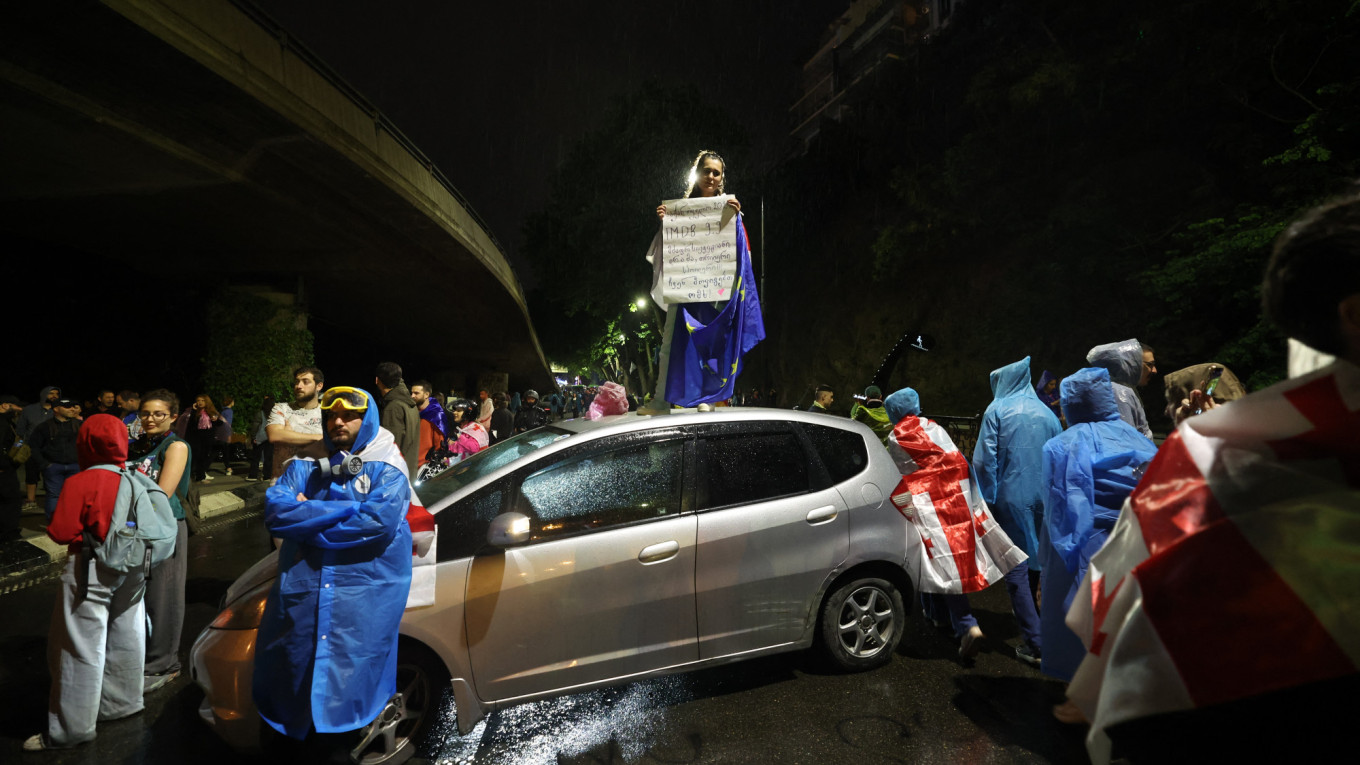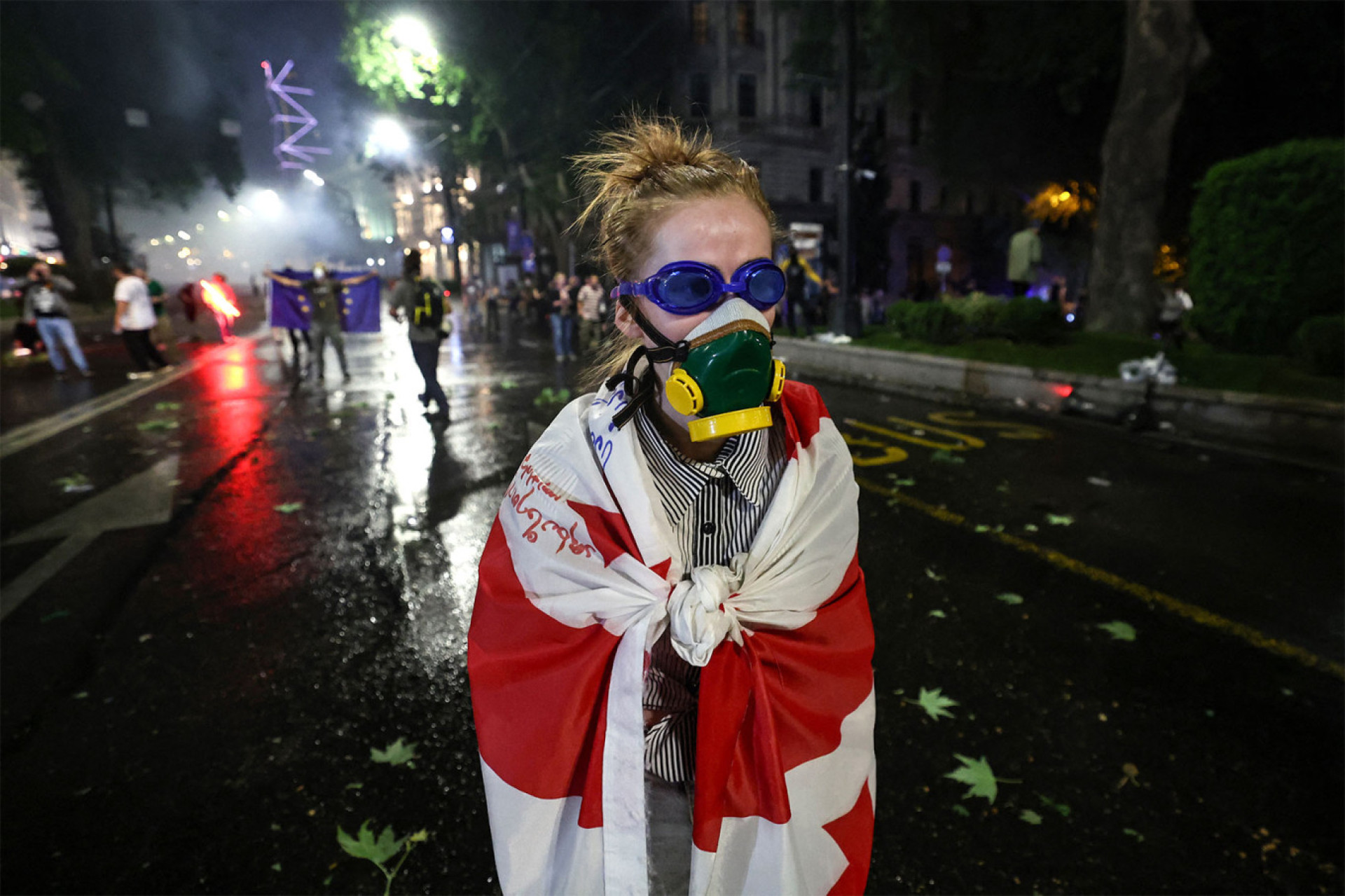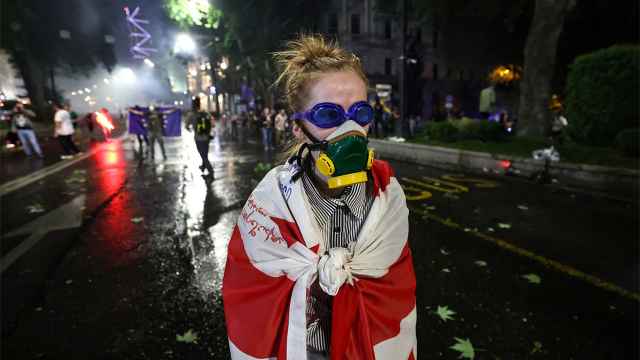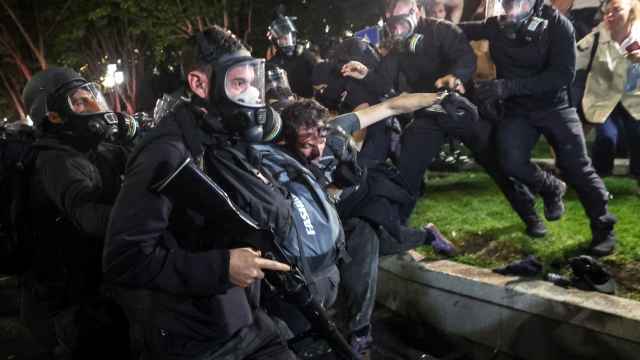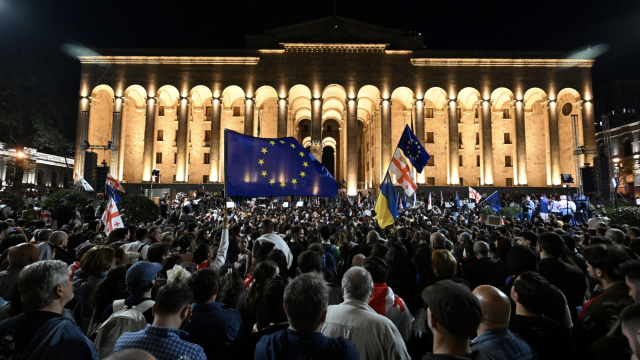There is a major problem at the heart of Georgia’s peculiar political economy. It goes back a quarter of a century. Starting in the 1990s, the late President Edvard Shevardnadze gave foreign aid agencies such leeway that toward the end of his feckless and corrupt rule, the local NGOs they funded became a vocal presence in the country’s politics, all the while maintaining confident relationships with international donors.
After years of turmoil and state failure, Georgians with deep convictions seized this moment to shape society. It felt fresh and energetic, even though it was driven by social entrepreneurs rather than broad-based grassroots movements.
After Shevardnadze’s former minister of justice, Mikheil Saakashvili, deposed him in the 2003 Rose Revolution, professionals from NGOs quickly filled senior government posts. The country’s policy space was thrown wide open to any and all foreign-led aid and reform experiments. The calculation behind this was that the net geopolitical and material benefits would far outweigh any drawbacks.
Consistently high foreign aid flows followed. UN agencies, the World Bank, international development aid groups, and private Western philanthropies opened well-staffed offices in Tbilisi. They needed local NGOs to implement their projects and provide a veneer of working with the community
Demand creates supply — today, more than 25,000 NGOs are registered in Georgia. According to the Georgian authorities, 90% of their funding comes from abroad. But this average hides the fact that for decades the vast majority of Georgian NGOs have received no local funding. They would probably find the very notion of asking Georgians for money absurd and could hardly win their support in their current form if they tried.
Foreign aid agencies and their local NGO contractors have long colonized most areas of public policy and services — education, healthcare, judicial reform, rural development, and infrastructure, just to name a few.
In practice, this plays out something like the following: a major development aid agency or international lender — for example, USAID, the European Commission, or the World Bank — has come up with a new model for education reform, which it plans to roll out in a whole host of countries.
To give it the appearance of community participation, the aid agency contracts Georgian NGOs to do the everyday footwork, including introducing the program to officials, schools, and teachers, as well as training them in the new skills they are said to require. But at no point does anyone ask teachers, parents, or students — or the electorate for that matter — what they need and want and how they themselves would improve education. People are left feeling unheard, ignored, and patronized — they also feel inadequate when they fail to reach the benchmarks all this training was supposed to help them achieve.
Georgian NGOs that receive grants to implement this work may be local, but they hold considerable power over the Georgian population. This power comes from their access to Western embassies and resources, but also from the legitimacy this conveys rather than from grassroots support.
Instead of the Georgian people voting for lawmakers to represent their interests, unelected NGOs get their mandate from international bodies, which draw up and pay for checklists of policy reforms in Georgia. Local NGOs lack an incentive to consider the impact of the projects they implement because they are not accountable to the citizens in whose lives they play such an outsized role.
This constellation of forces has eroded Georgian citizens’ agency and the country’s sovereignty and democracy.
However, the new bill on “foreign influence transparency” tabled by the Georgian Dream-led government — which attempted to pass similar legislation last year — will not address any of these issues. Nor is it even intended to address them. The Georgian government does not really care about the country’s sovereignty, and neither do the foreign donors, aid agencies, and local NGO elites.
The ruling Georgian Dream party, which has been in power since 2012, shows no intention to eradicate all foreign funding from the country. Quite the contrary. They are perfectly happy with the continued flow of foreign aid and how the donor-NGO-industrial complex churns out policies and poorly run public services. Georgia’s politics may be notoriously polarized, but Georgian Dream and most of the opposition parties are remarkably unanimous in their belief in technocratic, neoliberal, de-politicized governance, in which policies are designed by supposedly objective (foreign) experts. The more public services can be given over to the market in this way, the better, so they believe.
One needs only to look at the fate of the 2011 Liberty Act, a landmark piece of legislation that prohibits tax rate hikes and progressive taxation, while also capping government spending at 30% of GDP. Although it was passed into law by Saakashvili, Georgian Dream has not repealed it. So, too, has Transparency International Georgia, one of the country’s most prominent NGOs, (the most partisan of the NGOs leading the protests against Georgian Dream) campaigned to keep the law in place. These political camps may fight tooth and nail over who gets to run the country, but in the end, they all run it in the same way.
The continued outsourcing of policymaking, governance, and services to foreign donors, local NGOs, and the market suits the tastes of Georgian Dream’s leaders. Many of them studied in the West on Western scholarships and started their careers in UN offices, bilateral aid agencies, and, yes, local NGOs. They are drawn from the NGO-professional-managerial industry, which launched them into the upper-middle-class in a country where academia, medicine, law, science, or entrepreneurship do not afford middle-class status or lifestyles. The resumes and degrees of senior-ranking Georgian Dream officials hardly differ from those of their fiercest opponents in the foreign-financed NGO sector.
In this ecosystem, it is rare to find someone who genuinely cares about ordinary Georgians and their well-being. The local NGO landscape is deeply competitive and incentivizes sharp elbows and self-promotion rather than collaboration, let alone solidarity. For many industry professionals, working in an NGO is a fast track to the elite class — with high incomes, foreign travel, and receptions at embassies.
If Georgian Dream backs technocratic, depoliticized, donor-driven governance, all the while maintaining the large, foreign-funded NGO sector it requires, then why would it risk large-scale street protests at home and pressure from Brussels and Washington to pass its so-called “foreign influence” law?
Because on top of the major problem at the heart of Georgia’s political economy lies another, much trickier problem:the small but powerful clique of NGOs with annual budgets of up to millions of dollars from foreign donors — some of them close to the previous government of Saakashvili’s United National Movement — who openly engage in partisan politics.
For about five years, they have denied the government’s legitimacy and called for its ouster — and not just by supporting the opposition in elections, which already crosses ethical red lines for NGOs (especially when they are funded by foreign states). They agitate for a revolutionary change of power outside democratic, constitutional processes. Previously, they demanded to take over as a technocratic government. But since no one — certainly not the Georgian electorate — followed them up on that offer, these groups have fanned the flames of mass protests in front of parliament and other government buildings. For good measure, they are lobbying the EU and U.S. to sanction Georgian Dream leaders or slap travel bans on them.
Georgian Dream’s so-called “foreign influence” bill — first tabled last spring as a “foreign agents” draft legislation — squarely targets this hyper-partisan group of well-funded NGOs. There has been much speculation about why Georgian Dream abandoned its first attempt to pass last year’s aborted bill. One line of thinking suggests the party expects to win with force this time because they see the opposition as weak. Another reason, cited by Georgian Dream itself, is that the government tried to reach an agreement with Western embassies and grantmakers so that they would no longer fund partisan NGOs, or at least moderate their conduct through self-regulation. But this was rebuffed — if not by all, then at least by some key grantmakers. Behind closed doors, Western diplomats admit that the conduct of the partisan NGOs they finance crosses many lines and that something needs to change, but they get defensive when pressed on what they will do about it.
Where does this leave Georgian civil society? Undoubtedly in a worse-off place. All NGOs receiving foreign funding would face increased scrutiny and would have to perform additional administrative tasks if the “foreign influence” bill is passed into law, with some potentially risking fines. NGOs that steered well clear of partisan politics and tried to work according to their core mission and not that of their donors, while also respecting citizens’ agency, will get caught up in a policy that was never aimed at them. Never mind that this law would impose financial transparency requirements on NGOs while the corporate sector faces no such obligation.
This law will not restore Georgians’ sovereignty — not in any meaningful sense of re-empowering citizens and re-politicizing policymaking. It will probably not even solve the issue of partisan NGOs. It is not just a blunt tool — it is a bad tool.
At the time of writing, riot police are beating anti-government protesters in Tbilisi and using water cannons and pepper spray against them. Photos of bruises and bloodshot eyes are flooding social media. The political climate and public discourse have sunk to new lows in recent weeks. Georgia’s public sphere has been swept up in lies, hysteria, and manipulation, taking the country further away from reclaiming democracy and building progressive politics. There is a sense, expressed by a thoughtful and heavy-hearted Georgian observer, that “whichever way we go is a step back.”
Frustrating and tedious as it may be, we must cut through the swirling lies and the manipulation to restore a rational conversation. It is galling to see foreign grantmakers lecture the Georgian public with a straight face that there is no such thing as foreign influence tied to foreign money, that donors only want to support a vibrant civil society and would never dream of telling NGOs what they should do. Anyone who is at all familiar with the grantmaking process knows that donors set highly specific rules for which types of organizations, work, and issues they will even consider for funding.
Activists in Georgia know all too well what is expected of them, as well aswhat kind of behavior is punished and rewarded. Being critical of the government on Facebook will net you more grants than being out in the community helping people.
A few years ago, when Western donors still considered Georgian Dream a valuable ally, they would tell Georgian activists to stop criticizing the party. Now, they want activists to speak out against them. Donors even monitor activists’ social media profiles, in one author’s experience — and there can be consequences for posting the wrong things.
The shrill use of the moniker “Russian law” is another cynical tactic used by some Georgian activists, opposition politicians, and even Western officials. We are told that the draft law is copied from the Kremlin’s legislation and that it will turn Georgia into a new Russia, or at least dislodge the country from its path of EU integration. But this law is a symptom of specifically and uniquely Georgian political realities. Georgia in 2024 is nothing like Russia in 2012, when the latter adopted its own “foreign agents” law. Not politically, in terms of its international alliances, democracy, and the rule of law, and certainly not in terms of the role played by NGOs. The objectives of Russia’s “foreign agents” law — which helped pave the way for the near-complete destruction of independent media inside the country — were nothing like those of the Georgian bill.
Even more absurd are allegations that Georgian Dream and its founder billionaire Bidzina Ivanishvili are Russian puppets who introduced the “foreign influence” legislation at the instruction of Russian President Vladimir Putin. By this same logic, Putin must have also instructed the party to win EU candidate status and enshrine Euro-Atlantic integration in Georgia’s constitution. But this constant hand-wringing about a “Russian law” plays into the Georgian public’s fears and resentments, as well as into Western countries’ geopolitical objectives.
The most cynical and dangerous game, however, is tying this law to Georgia’s EU accession. Far-away Western observers get teary-eyed about images of Georgians standing up for their “vibrant civil society.” But on the ground, protesters say they are not trying to defend NGOs, nor do they care much about them, a view that is backed up by years of polling. Instead, people take to the streets because they have been told that this is a make-or-break moment for Georgia’s future in the EU.
Georgia’s aspiration for EU membership hits the rawest of all nerves in Georgian politics and culture. After three decades of post-Soviet impoverishment, of lives cut short, pain and trauma, chronic stress, insecurity, and humiliation, the idea of EU membership has become an eschatological project for many Georgians: it represents the promise of salvation after years of unjust suffering and sacrifice. The EU stands not just for dreams — of material well-being, safety, dignity, and comfort — coming true, but for recognizing Georgia as an inherently “European” nation. Then again, many Georgians out in the street with their EU flags have less metaphysical concerns. In recent surveys, Georgians rank the opportunity to emigrate as their number one reason for wanting to join the EU. Indeed, more than 5% of the population left between 2021 and 2022, most of them into Europe’s grim shadow economy.
But whatever the motivation, the prospect of EU membership represents something existential. This has allowed the opposition, its partisan NGO proxies, and their Western donors to manufacture this crisis into a desperate, epic battle for Georgians’ potentially bright future. Worst and most irresponsibly, EU officials have joined in, repeating one after the other that such a law is incompatible with “EU norms and values.” Language like this is conveniently vague, unlike actual EU laws, which do not prohibit regulating NGO funding. More recently, an EU spokesperson stated that adoption of a “foreign influence” law would go against the EU’s “values and expectations,” moving the goalposts into the evermore nebulous territory.
Fundamentally, the growing suspicion of foreign donors’ motives in funding hyper-partisan NGOs will only be fueled by forcing the government, via escalating threats to Georgia’s EU accession, to continue letting such funding in. This is a game of chicken that could go very dark. In these circumstances, with the fronts hardened and people’s existential fears manipulated, a frank debate about the decades-old problems that led to this draft bill in the first place, and about such a law’s effectiveness and appropriateness, is no longer possible.
This article was originally published in Left East.
A Message from The Moscow Times:
Dear readers,
We are facing unprecedented challenges. Russia's Prosecutor General's Office has designated The Moscow Times as an "undesirable" organization, criminalizing our work and putting our staff at risk of prosecution. This follows our earlier unjust labeling as a "foreign agent."
These actions are direct attempts to silence independent journalism in Russia. The authorities claim our work "discredits the decisions of the Russian leadership." We see things differently: we strive to provide accurate, unbiased reporting on Russia.
We, the journalists of The Moscow Times, refuse to be silenced. But to continue our work, we need your help.
Your support, no matter how small, makes a world of difference. If you can, please support us monthly starting from just $2. It's quick to set up, and every contribution makes a significant impact.
By supporting The Moscow Times, you're defending open, independent journalism in the face of repression. Thank you for standing with us.
Remind me later.




